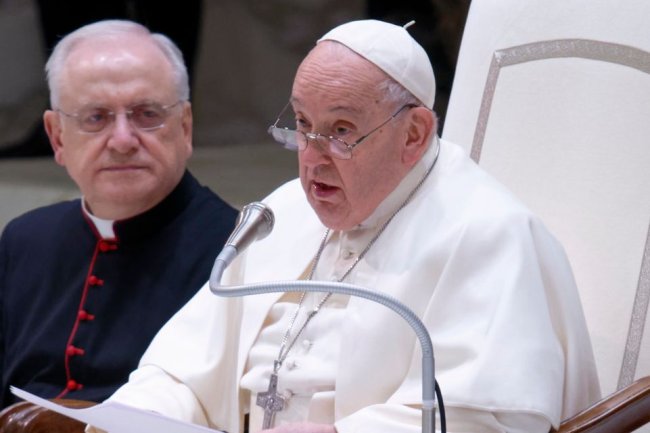Spain Votes in Election That Could Signal Shift to the Right
While the poll might not produce a clear winner, the Spanish far-right has never been closer to entering government Political posters urge voters toward the various parties running in Sunday’s election in Spain. Photo: JON NAZCA/REUTERS By Margherita Stancati and José Bautista July 23, 2023 3:00 am ET Spaniards began casting their ballots Sunday in an uncertain election that will determine whether the country follows others in Europe in taking a sharp turn to the right. A faltering postpandemic economic recovery, high inflation that has eroded purchasing power, persistently high immigration and the mounting toll from Russia’s long war in Ukraine have all combined to weaken established parties across the continent. In Spain, the odds are against Prime Minister


Political posters urge voters toward the various parties running in Sunday’s election in Spain.
Photo: JON NAZCA/REUTERS
Spaniards began casting their ballots Sunday in an uncertain election that will determine whether the country follows others in Europe in taking a sharp turn to the right.
A faltering postpandemic economic recovery, high inflation that has eroded purchasing power, persistently high immigration and the mounting toll from Russia’s long war in Ukraine have all combined to weaken established parties across the continent.
In Spain, the odds are against Prime Minister Pedro Sánchez. After five years in office, he called snap national elections following crushing local and regional electoral defeats for his left-wing coalition.
His party’s traditional rival, the center-right Popular Party, is widely expected to come first in the ballot but fall short of an absolute majority. To form a government, the PP will likely need the support of the far-right Vox party—something Alberto Núñez Feijóo, the PP’s leader, has said he is eager to avoid.

Far-right party Vox leader Santiago Abascal, center, campaigns in Guadalajara.
Photo: oscar del pozo/Agence France-Presse/Getty Images

Prime Minister Pedro Sánchez faces a tough fight to stay in power.
Photo: Carlos Castro/Zuma Press
The latest polling shows it is still possible for Sánchez’s Spanish Socialist Workers’ Party to cobble together enough support from other left-wing and regional parties to secure a rival parliamentary majority. Should there be no clear winner, Spaniards might be asked to go to the polls a second time.
“For Vox to enter government with a position like vice-premier is a big deal. It is something that they want—and it is exactly what Feijóo doesn’t want, having [Vox leader Santiago] Abascal in a prominent position, tarnishing his reputation,” says Ignacio Torreblanca, a Madrid-based political analyst at the European Council on Foreign Relations.
“The Socialists are capitalizing on the fear that the PP will come to power with Vox. Centrist voters will be decisive, whether they vote for the Socialists, the PP or abstain.”
Sánchez steered Spain through the Covid-19 pandemic with an efficient vaccination campaign. His government has been more successful than most others in Europe in shielding the economy from the energy crisis sparked by the war in Ukraine, and it managed to bring down inflation from a peak of 10.7% a year ago to 1.6% in June.
Yet anger over the cost of living continues to linger. Sánchez also faces criticism for his reliance on small, pro-independence parties in Catalonia and the Basque Country and for his alliance with the far-left party Podemos.
These are issues that have swung voters such as Nur Martín, a 22-year-old university student, who voted for the Socialists in 2019 but is now backing Vox.
Sánchez “said he would never make deals with [the left-wing Basque party] Bildu or with Podemos, but he did. For me, he has no credibility. Vox is the opposite,” said Martín.

Alberto Núñez Feijóo, the Popular Party’s leader, would likely need the support of the far-right Vox party if his party finished first in balloting.
Photo: Angel Garcia/Bloomberg News
Vox’s elevation from antiestablishment party to possible kingmaker is in line with a broader rightward shift happening across Europe. From Germany to Sweden, far-right parties once regarded as fringe opposition groups increasingly have a say in how their countries are run.
Some have become more moderate along the way. In Italy, Prime Minister
Giorgia Meloni has moved away from her far-right past, embracing mainstream conservative positions on issues ranging from the European Union to military support for Ukraine. Others have pulled mainstream conservatives toward them.In Spain, Vox’s strident rhetoric against migrants and its denial of man-made climate change are among the issues that many of the PP’s leaders and voters find distasteful. That didn’t stop PP leaders in regions including Valencia and Extremadura from forming ruling coalitions with Vox after the recent local elections.
Key to Vox’s rise has been its opposition to separatist movements in Spain. It sharply criticized mainstream parties on the left and right for being too lenient toward separatists in Catalonia, after they staged an illegal referendum for the region’s independence in 2017.
According to the latest polls, Vox is projected to come in third with roughly 13% of the vote, in line with the previous election. The PP is expected to win around 34% of the votes, and the Socialists, 28%. Sumar, a group of left-wing parties and the Socialists’ most likely coalition partner, is projected to win around 13%.
Turnout will be a big factor in Sunday’s vote. Many Spaniards are away vacationing and the scorching heat might put many people off going to the polls. Some 2.6 million people have requested to vote by mail, nearly three times the number in the 2019 elections.
Alejandra Sánchez, 48, voted by mail for the PP. “I’m looking for a party that governs with all Spaniards in mind and that puts an end to this political polarization that has pitted the right and the left in recent years ,” she said. “I want a united Spain.”
Write to Margherita Stancati at [email protected]
What's Your Reaction?













